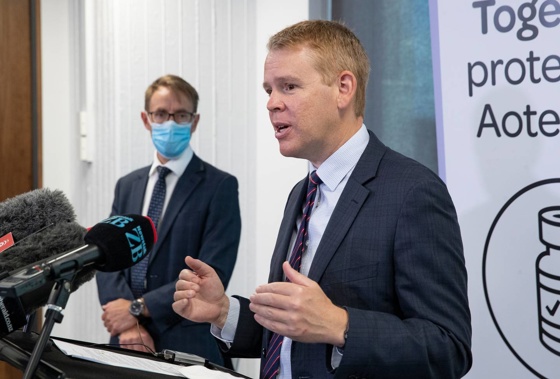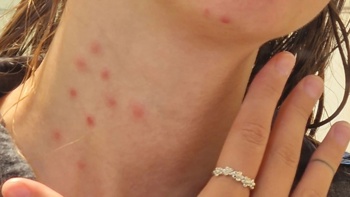
School students, unvaccinated or not, can now participate in all school activities, Chris Hipkins has announced.
The Covid-19 Response MInister said a week ago Covid was in 1 in 10 schools, it's now in one in five.
Gathering limits will now no longer apply to school activities such as sport when there are un-vaxxed students.
40 million face masks are being distributed. Teachers are expected to wear medical masks, but kids can use cloth masks. There will be back up supplies for children in schools, including smaller size medical grade, he said.
Portable air filters and CO2 monitors are also being dispatched to check ventilation.
More than 700,000 rapid antigen tests can be distributed by the Ministry of Education if schools need them to keep up staffing levels, Hipkins said.
It would only be in extreme circumstances that teachers would go into school under the critical workers scheme, using RATs instead of isolation. Such as if the school couldn't keep running without them.
Hipkins said retailers would also very soon be able to sell RATs.
"Rapid antigen tests are no guarantee, so we would only put someone in the school environment with that level of risk if we really had to."
He said overseas studies showed RAT's could be missing one in five cases.
That was too risky for schools, so schools would first be expected to try to secure relief staff or take other measures to fill in for staff who had household cases of Covid-19.
On sports, Hipkins said they never intended children to be barred from playing sport if they were not vaccinated.
However, some schools were interpreting practices such as kapa haka and other school activities to require a vaccination pass.
He said any school activities would not need a vax pass for students. "We are just clarifying those rules to be crystal clear."
On club sport for children, Hipkins said club sport was treated differently.
It was up to clubs to offer an unvaccinated option for children who weren't vaccinated.
"There's a degree of hesitancy around having unvaccinated people involved in those activities, they are worried other people won't take part if there are unvaccinated people involved."
However, he said when it came to school-arranged activities, children should be able to participate fully in school activities, regardless of whether they were vaccinated.
He said the Prime Minister had signalled restrictions would be eased after the Omicron peak, and so the club sport issue could be resolved at that point.
He said they did want children and teachers on-site as much as possible, but there would be situations where that was not feasible.
Parents would be subject to the same rules meaning unvaccinated parents could take part in school-arranged activities, but if it was out of school the vaccination pass requirements would apply to them.
He said it was possible there would be further advice on boosters for children in the future.
When the technical experts advised giving boosters to children, they were ready to do that.
He said boosters rates were high in the most vulnerable population - the elderly but the evidence around the impact boosters would have on infection and severity of Omicron in children was still emerging.
Blended learning, where some children were at home and others at school, was difficult and support would be provided in those situations, Hipkins said.
He said there was interest among teachers in having access to RATs, but not necessarily to be able to go into school if they had a household Covid case.
There were at least 5000 air cleaners available for the winter period, when ventilation was harder.
The country has woken to a new era in its Covid-19 response, with a shift to personal testing and reporting as the virus runs rampant.
There were 6137 new community cases of Covid-19 and one death reported yesterday - an increase of 86 per cent on Wednesday's number and not something New Zealand has not seen on a national scale.
The ministry also announced there were 205 people in hospital - more than double the previous daily record of 93 during the peak of the Delta outbreak last year.
Importantly though there were just two people in intensive care, which experts put down to high overall vaccination and still-rising booster rates.
The rising case numbers, pressures on testing stations and number of people needing to isolate has heralded a shift to phase 3 of the Omicron response today, with reduced self-isolation requirements and a focus on rapid antigen tests (RATs) and self-reporting.
Now, only confirmed cases and household contacts of a confirmed case will need to isolate for 10 days.
A PCR test will also no longer be required to verify a positive RAT result - and RATs will be available across the country from testing sites, GPs, pharmacies and within workplaces. People will be able to self-report their positive results and notify contacts.
RATs will be free to those who require them for testing, and available for purchase for about $8 to $10.
Director-General of Health Dr Ashley Bloomfield says the PCR tests have served us well and had helped us understand the situation, but it was now at the stage where rapid antigen tests are the better option - given the high number of Covid cases in the community.
On moving into Phase 3, Bloomfield said people would still want to know if they have contracted Covid because they want to keep their families safe.
The country already has "millions" of RATs in the country and another 5 million RAT tests are due to arrive in the coming days, he told ZB's Mike Hosking.
Bloomfield then went on to say 10 million RATs are due to arrive over the weekend.
On people travelling into the country and still having to isolate, he said officials would be looking into that and seeking advice about that going forward.
Asked whether the New Zealand public was too scared of the Omicron outbreak - in comparison to the rest of the world - Bloomfield acknowledged that worry was still warranted.
Despite the Omicron Covid variant being less severe than the Delta variant, people can and will still die, he said.
However, in terms of living with the virus now, Bloomfield said: "We're making a big shift now."
The changes to isolation requirements have raised questions around overseas arrivals into the country.
There were just eight cases detected at the border on Thursday - a figure that has been steadily declining since in the 50s in mid-January as countries around the world move away from their Omicron peaks.
Vaccinated Kiwis will be able to fly into New Zealand from Australia without having to go into MIQ from 11.59pm on Sunday, February 27. However, they will still be required to self-isolate for seven days, despite also having to produce a negative pre-departure test.
This is in contrast to the fact people in New Zealand who have come into contact with positive Covid-19 cases will no longer need to self-isolate.
The border will be progressively opened to the rest of the world in the coming months but travellers from overseas will also be required to self-isolate at this stage.
Hipkins said the Government was reviewing self-isolation requirements for people coming into the country, and would make decisions in the next month.
Tourism Industry Aotearoa's Ann-Marie Johnson said with self-isolation requirements, New Zealand would "remain off the radar for high-value international holidaymakers".
"Few people will want to spend the first few days of their New Zealand holiday in self-isolation.
"The sooner we can signal intentions and timelines for reopening both our air and maritime borders without the requirement for self-isolation, the sooner tourism operators can get back to doing what they do best."
Act Party leader David Seymour has also been calling for an end to MIQ for similar reasons. On Thursday his party released new Covid-19 policy, which called for a dramatic reduction in restrictions, citing the higher infectiousness and lower virulence of the Omicron variant.
This included for people to only self-isolate until they returned a negative test result, and ending all vaccine requirements.
National Party Covid-19 spokesman Chris Bishop said the mass reliance now on RATs had shown how unprepared the Government had been.
"Testing capacity in New Zealand is already overwhelmed. People trying to do the right thing and get tested are waiting in queues for hours and then up to seven days for the results.
"New Zealand has a massive shortage of tests because the Government didn't order enough, early enough."
Responses to Written Parliamentary Questions showed the Government had only ordered 13.2 million tests by the end of 2021, and only started ordering in November.
"Meanwhile, everyone in England has been able to order 14 tests a week since April 2021," Bishop said.
Covid-19 modeller Dr Dion O'Neale said the change to RATs and self-testing and close contact definitions meant people could find out if they were infectious faster, but also meant some cases could not be reported.
O'Neale said the Government should carry out infection prevalence surveys, similar to in the United Kingdom, to thus determine wider levels of transmission.
Meanwhile, the protest site at Parliament has been labelled a location of interest after the Ministry of Health reported at least two positive cases had attended.
All attendees on Saturday and Sunday were deemed close contacts, but because of the shift to phase 3 no longer need to self-isolate.
Take your Radio, Podcasts and Music with you









